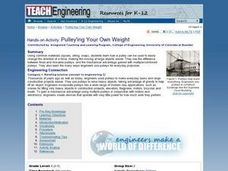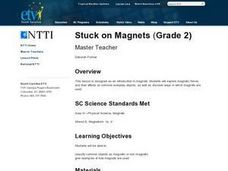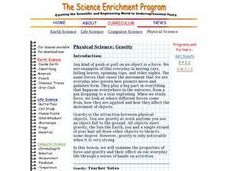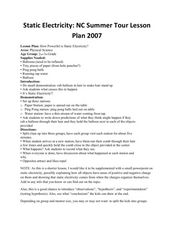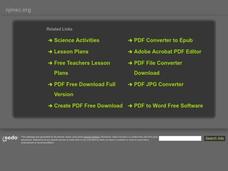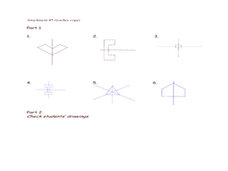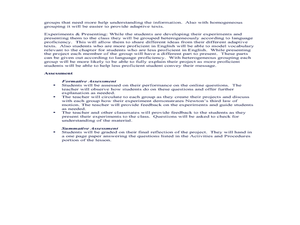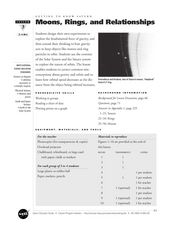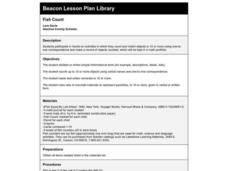Curated OER
TE Activity: Pulley'ing Your Own Weight
Learners experiment with common objects such as spools, string and soap to determine how pulleys make it easier to move large objects. They look at the difference between fixed and movable pulleys. They examine the many uses engineers...
Curated OER
The North (Wall) Star
Students engage in a lesson which shows them that celestial navigation is the art and science of finding one's geographic position by means of astronomical observations, particularly by measuring altitudes of celestial objects - sun,...
Curated OER
Alphatech
Students explore letters and their sounds. In this beginning phonics literacy lesson, students bring objects from home that begin with an assigned letter. Students show their object/s and the teacher takes a picture. ...
Curated OER
Stuck on Magnets
Second graders are introduced to magnets and magnetic forces. In groups, they discover which everyday materials are magnetic and their effect on other objects. Using the internet, they examine the various uses of magnets in the real...
Curated OER
Science- Unit on Matter- Liquids-
Second graders discover that everything is made of matter. they determine the properties of liquids and that like solids, liquids can be grouped or classified according to properties or qualities. they assess that solids have a definite...
Curated OER
Hot Cans and Cold Cans
Young scholars investigate the physics of heating and cooling through conduction, convection, and radiation. Working in groups, they determine the best way to cool a can of water and warm a can of water. Temperature is taken at five...
Curated OER
Vision and Optics: Light and Lenses
Young scholars gain a conceptual comprehension of the functioning of the Human Eye in relation to optics and optical vision correction. They explore optics with light sources and various lenses, relating these to visual acuity,...
Curated OER
Physical Science: Gravity
Students investigate the properties of force and gravity and their effects on everyday life. In groups, they test various balls by bouncing them on different surfaces and observe the properties. In another activity, they test marbles and...
Curated OER
How Powerful is Static Electricity?
Students break up into groups to complete a demonstration rubbing a balloon in hair make their hair stand up. Thus, they conclude static electricity. They also experiment with a paper station, ping pong station and a water station...
Curated OER
Classification and Identification
Students, after exploring and analyzing diagrammatic and taxonomic keys and their association to marine sciences, identify and classify objects and organisms based on visual attributes/characteristics. They research and create their own...
Curated OER
How Many?
In this counting worksheet, students count the number of objects in groups and write the total numbers. Students count five groups of objects.
Curated OER
The Magic School Bus Taking Flight
Young scholars learn along with Ms. Frizzle's class. In this Magic School Bus lesson plan, students see how gliders coast by exploring the way different paper objects fall to the ground.
Curated OER
Measurement Crafts- Cereal Hands and Feet
Students identify nonstandard units of measurement and investigate area of objects. In this geometry lesson, students trace their hands and glue cereal pieces to the print to find the area.
Curated OER
Repair, Reuse, Recycle
Students read "Joseph had a Little Overcoat" and explain why his clothing didn't go to waste. In this repairing, reusing, recycling lesson, students recognize by reusing objects they help the environment. Students write their ideas for...
Curated OER
Grams and Kilograms
Fourth graders participate in scavenger hunts for objects that weigh a gram and a kilogram. For this metric measure lesson, 4th graders use a spring scale to measure objects they believe weigh a gram and a kilogram. Students complete...
Curated OER
Symmetry and Tangrams
Sixth graders build figures out of tangrams. In this symmetry lesson, 6th graders view tangrams and identify the polygons included in them. Students divide into groups, identify their tangram pieces, define the lines of symmetry, and use...
Curated OER
Isaac Newton's Third Law of Motion
Ninth graders experiment with Isaac Newton's Third Law of Motion. In this Third Law of Motion lesson, 9th graders develop an experiment that shows their understanding of this theorem. They work in small groups to read an article at a...
Curated OER
Scavenger Hunt for Lengths
Students practice measurement using real world objects. In this scavenger hunt for lengths lesson, students collaborate to measure with rulers, yardsticks, trundle wheels, and tape measures. Students must estimate the length then...
Curated OER
Factoring Trinomials
Students factor trinomials using algebra tiles and blocks. In this algebra lesson, students complete a trinomials station activity. They work backwords to find their answers and discuss their steps in a group.
Curated OER
Guess Who? Coral
Fourth graders identify and group coral formations. In this coral identification lesson, 4th graders examine coral pictures, discuss vocabulary, and provide similarities and differences in the growth formations.
Curated OER
Getting to Know Saturn: Moons, Rings, and Relationships
Students identify the different objects that orbit Saturn. In this space science lesson, students plot the graph of orbital speed and distance. They explain why planets and asteroids remain in orbit around the sun.
Curated OER
Fish Count
Students participate in hands-on activities in which they count and match objects to 10 or more using one-to-one correspondence and make a record of objects counted, which be kept in a math portfolio.
Curated OER
Creating an Enzyme-Substrate Model
Students explore the reaction rates of an enzyme-mediated reaction through experimentation. In small groups, they use everyday objects to demonstrate the effects of environmental variables on enzyme function.
Students graph and...
Mathematics TEKS Toolkit
Grade 6: Exploring c/d = pi
Introduce your math class to the perimeter of a circle. Teach them that pi describes the relationship between the circumference and the diameter. As a hands-on investigation, pairs or small groups use string to compare these two values...


